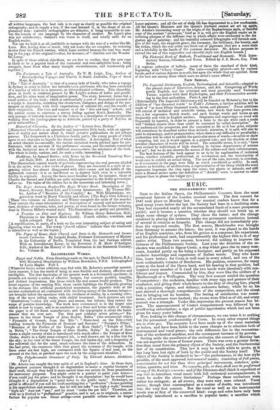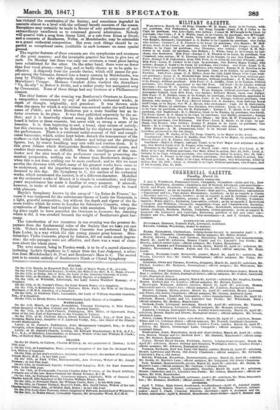MU S IC.
THE PHILHARMONIC SOCIETY.
Next to the Italian Opera, the Philharmonic Concerts form the most prominent feature of the London musical season. The first concert for 1847 took place on Monday last. Our musical readers know that for a good many years before the last the Society had been in a declining state. They had expended nearly all the accumulated funds of a more prosperous period; and it became a question whether they should not break up, or adopt some change of system. They chose the latter; and the change consisted in placing the orchestra under one permanent conductor, instead of several in rotation as formerly. This change did not immediately pro- duce the expected results. The first season, Mendelssohn was brought • from Germany to assume the baton; the next, it was placed in the hands of an English musician, who, from his genius as a composer, his experience, and his professional rank, had unquestionably the highest title to it of any native artist. Those two seasons, however, did nothing to improve the fortunes of the Philharmonic Society. Last year the direction of the or- chestra was confided to Signor Costa; a step which gave rise to many mur- murs, founded partly on his being a foreigner, and partly on his suppeeed. exclusive knowledge and experience of Italian music. They who knew him, knew better; for Costa is well read in every school, and one of the most enthusiastic votaries of Beethoven. His position, moreover, for many years at the head of the Opera band, and his bearing in that position, had inspired every member of it (and the two bands were identical) with con- fidence and respect. Commanded by him, they were like the soldiers of a Marlborough or a Wellington. The very first concert settled the question of competency: the orchestra, familiar with every sigu and gesture of their conductor, and giving their whole hearts to the duty of obeying him, played with a precision, vigour, and delicacy, unknown before; while he on his part showed a thorough comprehension of the composition, and the nicest tact in bringing out its beauties. The feeling of satisfaction was unani- mous; all murmurs were hushed; the rooms were filled as of old, and every concert was a triumph. Under this impression the present season has be- gun. The announcement of Costa's reappointment was followed by an overflowing subscription; a sign of public approbation which had not been given for many years' before. Now, looking to this change of circumstances, we can trace it to nothing but the permanent conductorship of Costa. In every other respect things are in slats quo. The concerts have been made up of the same materials as before, and have been liable to the same charges as to selection both of instrumental and vocal pieces; the sole difference lies in the reconstruc- tion of the orchestral machine, and the consequent increase of its powers. Setting aside the excellence of the orchestra, the concert of Monday last was not superior to those of former years. There was even a greater devia- tion than usual from the primary object of the Society, and the fundamental law of its constitution. This law it may be worth while to quote, as it has long been lost sight of both by the public and the Society itself. The object of the Society is declared to be—" the performance, in the best style possible, of the most approved instrumental music; consisting of full pieces, concertantes for not less than three principal instruments, sestettos, qnin- tettos, quartets, and trios. No concerto, solo, or duet, shall ever be performed at any of the Society's concerts; and if the Directors shall think it expedient at any time to introduce, vocal music with full orchestral accompaniments, it must be under the above limitations." Perhaps these exclusions were rather too stringent; at all events, they were very soon relaxed. Vocal music, though thus contemplated as a matter of doubt, was introduced into the very first concert. But the vocal as well as the instrumental music was at first of the concerted kind : songs and solos have only been gradually introduced as a sacrifice to popular taste; a sacrifice which
has violated the constitution of the Society, and sometimes degraded its concerts almost to a level with the ordinary benefit concerts of the season. Exceptions may certainly be made in favour of solo performances of such extraordinary excellence as to command general admiration. Nobody will quarrel with a song from Jenny Lind, or a solo from Ernst or Sivori; and a concerto of Beethoven, Weber, or Mendelssohn may be admissible as a grand orchestral composition. But even such things should be re- garded as exceptional cases, justifiable in each instance on some special ground.
The regular features of these concerts are the symphonies and overtures of the great masters; and the invariable practice has been to give two of each. On Monday last there was only one overture, a vocal piece having been substituted for the other. On the other hand, there were no fewer than four vocal pieces,-very long, and so badly chosen as to be quite in- effective. A rhapsody from the pseudo Ossian, which still passes for gos- pel among the Germans, formed into a heavy cantata by Mendelssohn, was sung by Phillips; who afterwards stormed through a noisy scene from Marschner's Vampyr. Madame Caradori Allan warbled the threadbare " Va, dit-elle" in Robert le Diable, and a rather pretty but antiquated song by Crescentini. None of these things had any business at a Philharmonic concert.
The chief feature of the evening was Beethoven's Overture to Leonora; a composition unsurpassed by any of its author's orchestral works, in depth of thought, originality, and grandeur. It was thrown aside when the opera for which it was:written was revived under the well-known name of Fidelio, and when Beethoven put a more familiar but an in- ferior overture in its place. It was then published separately by the au- thor; and it is deservedly classed among his chefs-d'osuvre. We have heard it before at these concerts, but never with so strong a sense of its beauties. It is, from beginning to end, a broad, clear stream of melody; but this clearness is liable to be disturbed by the slightest imperfection in the performance. There is a continual under-current of full and compli- cated harmonics, which, unless kept below, disturb the transparency of the surface-a rich background, which relieves and brings out the principal figures, but, by coarse handling, may mix with and confuse them. It is this great fulness which distinguishes Beethoven's orchestral scores, and renders their execution so difficult. When the intelligence of the con- ductor and the nice touch of the performers succeed in preserving the musical perspective, nothing can be clearer than Beethoven's designs- when this is not done, nothing can be more confused; and to this we must ascribe the slowness with which many of his greatest works have come to be understood, and the imperfect manner in which some of them are un- derstood to this day. His Symphony in C, the earliest of his orchestral works, which terminated the concert, is of a different character. Modelled on the orchestral works of Mozart, it is simple in construction; and thirty years' acquaintance has made it familiar to every amateur. It abounds, however, in traits of bold and original genius, and will always be heard with pleasure.
Haydn's Symphony known by the name of " La Reine de France," be- cause it was composed for the unfortunate Queen of Louis the Sixteenth, is a light, graceful composition, but without the depth and vigour of the fa- mous twelve which he wrote in London for Salomon's Concerts, when the symphonies of Mozart had inspired him with emulation. This very pleas- ing piece ought to have preceded the Overture to Leonora; for, standing where it did, it was crushed beneath the weight of Beethoven's giant har- mony.
The introduction of two concertos in one evening was the greatest de- parture from the fundamental rules of the Society that we have yet met with. Weber's well-known Pianoforte Concerto was performed by Miss Kate Loder, in a way which did this young pianist great honour. Men- delssohn's Violin Concerto, played by Sainton, did not make much impres- sion: the solo passages were not effective, and there was a want of clear- ness about the whole piece.
The next concert, being in Passion-week, is to be of a sacred character; including Spohr's Symphony in C minor from the Last Judgment, a selec- tion from Iffendelssohn's St. Paul, and Beethoven's Mass in C. The second part is to consist entirely of Beethoven's Ninth or Choral Symphony.



























 Previous page
Previous page